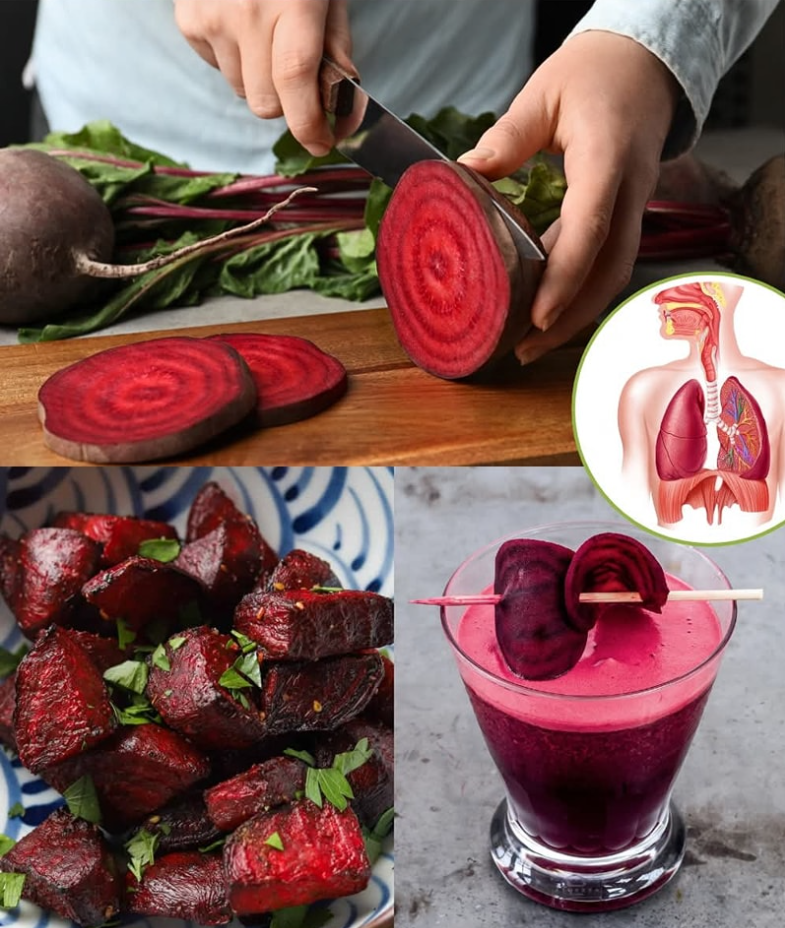If you’re planning to incorporate beetroot into your meals or daily routine, here are some common ingredients you might combine it with:
-
Fresh beetroot (raw or cooked)
-
Lemon juice (for detox drinks)
-
Carrots and apples (for juice blends)
-
Olive oil and vinegar (for salads)
-
Greek yogurt (for beetroot dips)
-
Garlic, herbs, and spices (for roasting or soups)
Preparation:
Beetroot can be prepared in multiple delicious and healthful ways:
-
Raw in Salads – Shred or grate fresh beetroot and mix with carrots or cabbage.
-
Juiced – Combine with apples, ginger, and carrots for a detoxifying juice.
-
Roasted – Cube beets, drizzle with olive oil, and roast at 200°C (390°F) for 25–30 minutes.
-
Steamed or Boiled – Cook until tender, then slice into salads or serve warm.
-
Beetroot Hummus – Blend cooked beetroot with chickpeas, tahini, garlic, and lemon juice.
Serving and Storage Tips:
-
Raw beetroot can be stored in the fridge for up to 3 weeks.
-
Cooked beetroot keeps well in airtight containers in the fridge for 3–5 days.
-
Beet juice is best consumed fresh but can be stored in the fridge for 24 hours.
-
Avoid cutting beetroot until ready to use, as it dries out quickly.
-
Wear gloves when peeling or chopping to avoid staining your hands.
Variants:
-
Golden beetroot has a milder flavor and less earthy aftertaste than red beet.
-
Fermented beetroot (beet kvass) offers probiotic benefits for gut health.
-
Beet greens are edible and rich in nutrients — sauté them like spinach.
-
Beetroot powder is a convenient, shelf-stable option for smoothies or baking.
12 Health Benefits of Beetroot:
-
Improves Blood Flow – Rich in nitrates, beetroot helps relax and widen blood vessels.
-
Lowers Blood Pressure – Regular consumption may significantly reduce systolic blood pressure.
-
Boosts Stamina – Great for athletes, beet juice enhances endurance and performance.
-
Supports Liver Health – Contains betaine, which helps the liver detoxify.
-
Aids Digestion – High fiber content promotes healthy bowel movements.
-
Fights Inflammation – Packed with antioxidants and anti-inflammatory compounds.
-
Enhances Brain Function – Improved circulation can lead to better focus and cognitive performance.
-
Supports Heart Health – Beets help lower bad cholesterol and improve vascular function.
-
Detoxifies the Body – Natural cleansing properties assist in flushing toxins.
-
Rich in Iron – Helps prevent anemia and supports red blood cell production.
-
Good for Skin – Antioxidants fight free radicals, improving skin glow and texture.
-
May Help Prevent Cancer – Some studies suggest beets may inhibit the growth of cancer cells.
FAQ:
Q: Can I eat beetroot every day?
A: Yes, moderate daily consumption (1 small beet or a glass of juice) is generally safe and beneficial.
Q: Are there any side effects of eating too much beetroot?
A: Eating large amounts can cause beeturia (pink urine) or kidney issues in sensitive individuals due to oxalates.
Q: Is beetroot safe for diabetics?
A: Beetroot has a moderate glycemic index and may help control blood sugar when eaten in moderation.
Q: What’s the best time to drink beetroot juice?
A: Mornings are ideal for energy, or 2–3 hours before workouts for performance benefits.
Q: Can I use canned beetroot?
A: Yes, but opt for low-sodium or no-sugar-added versions when possible.
